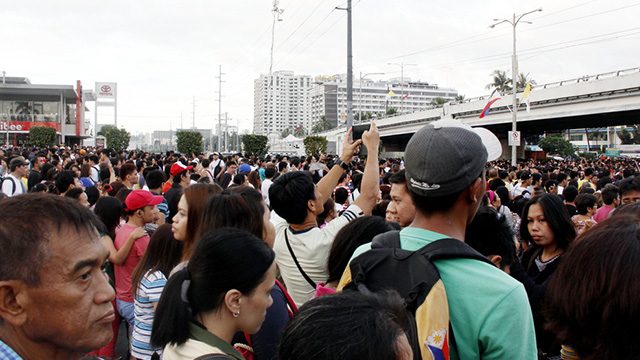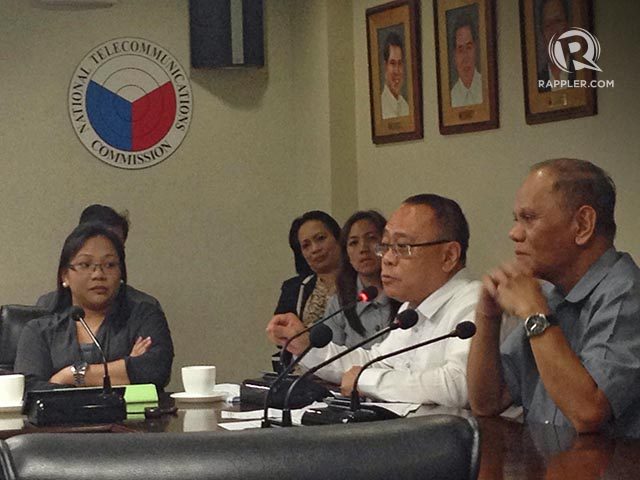SUMMARY
This is AI generated summarization, which may have errors. For context, always refer to the full article.

MANILA, Philippines – Rules covering minimum speeds for services advertised as “mobile broadband” will be released by November, the Philippines’ telecommunications regulator said on Tuesday, September 15, as it finalizes a draft that will integrate feedback from several groups.
The National Telecommunications Commission (NTC) is looking at a minimum advertised speed “slower than fixed broadband’s 256 kbps (kilobytes per second)” for mobile broadband services, its regulations director Edgardo Cabarios said on the sidelines of a public hearing in Quezon City on Tuesday.
These draft rules came after the NTC on August 13 signed Memorandum Circular No. 07-08-2015, stating that “fixed-line broadband,” such as DSL, fiber, and cable must have data connection speed of at least 256 kilobits per second (kbps) – the standard of the International Telecommunications Union.
NTC noted in its draft rules for mobile broadband services that “about 90% of Internet users in the Philippines are on mobile, while only 10% use fixed-line services.”
The telecommunications regulator will release final rules by November, after it receives inputs from the private sector, industry groups, and civil society organizations regarding the circular on mobile broadband services, Cabarios told Rappler.
“We will try to have a public hearing every week to discuss every concern every stakeholder wants to raise,” the NTC director said during the hearing.

‘Uncontrollable variables’
In its draft circular, the NTC wants to monitor and measure mobile Internet services in terms of download and upload data rate, jitter, packet loss, as well as latency. (READ: Monopolies, duopolies hamper PH inclusive growth)
NTC said it plans to conduct measurements of mobile Internet service providers (ISPs) simultaneously where the test devices register full bar signal and the least received power.
The measurement of mobile Internet speeds would be made during peak and off-peak hours for at least twice a week.
According to the draft circular, the NTC said measurement of speeds would take into consideration “uncontrollable variables” including signal strength depending on the distance of test locations from the access network.
This was contested by some industry groups, with one consumer advocate group saying that taking into account “uncontrollable variables” would only “formalize ISPs’ alibis for not delivering good service.” (READ: Slow Internet? Blame red tape – telcos)
“The NTC is laying the predicate for their future apologies. For example, the so-called extraordinary ‘uncontrollable variables’ built in the circular practically formalizes ISPs’ alibis for not delivering good service,” Anthony Ian Cruz, TXT Power president, said on the sidelines of the hearing.
“That is why in the [rules for] mobile broadband, it would be better to take that entire line out,” Cruz added.
For Mary Grace Santos, an independent researcher for think-tank LIRNEasia, “uncontrollable variables should be defined properly” by the NTC.
“There are many factors that could land under ‘uncontrollable variables.’ For example, signal propagation and how the network is optimized. Say for instance, people in high-rise buildings will receive probably weaker signal than those in ground floors. Also, there are factors like adverse weather and cell density. These should be properly identified,” Santos told NTC officials.
As for the “slower than 256 kbps,” TXT Power’s Cruz said “it is a festering problem.” (READ: New Internet speed minimum throwback to ’90s?)
“Maybe, we are waiting for another set of rules, like the IRR (implementing rules and regulations) of Philippine Competition Act, which could provide consumers an added weapon. We have to welcome each step forward, however small,” he added.
NTC’s Cabarios said his office proposed to publish the average results of tests for each ISP on its website within 5 days from the end of each month.
“The results would include test locations and data plans tested,” the NTC director said. — Rappler.com
Sea of people using smartphone photo from Shutterstock
Add a comment
How does this make you feel?
There are no comments yet. Add your comment to start the conversation.